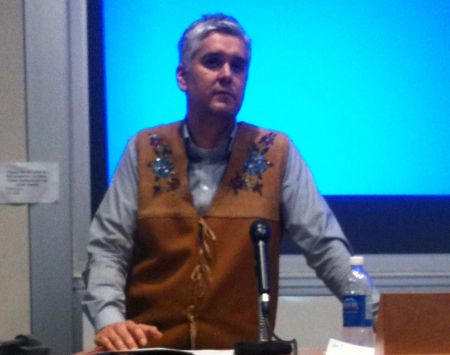Dr. Glen Coulthard is a member of the Yellowknives Dene and a scholar of contemporary Indigenous politics and political thought. He is an Assistant Professor in First Nations Studies and the Department of Political Science at the University of British Colombia in Vancouver, Coast Salish Territory.
He is a founding member of the Camas Books & Infoshop in Victoria and the Dechinta Center for Research and Learning in Yellowknives Dene territory and a member of the Frank Paul society. Coulthard has also participated in the Purple Thistle Institute.
On the cold blizzardy evening of January 12th, Glen Coulthard gave a talk to a crowd in Halifax on unceded and occupied Mi’kmaw territory called Place Against Empire: Primitive Accumulation, Settler Colonialism and the Occupy movement. Coulthard emphasized the need to understand the theft of Indigenous lands through Canadian history and its ramifications for present-day politics. Coulthard argues that Indigenous radicalism is rooted in a relationship to land and place that runs counter to prevailing Canadian capitalist ideologies of private property and resource exploitation. And he posits that a failure of the Occupy movement in North America is not recognizing the privilege of the 99% over the theft of land and resources from the indigenous 4%.
(Click here to hear Place Against Empire)
He spoke again on Friday, January 13. This talk “Seeing Red: Recognition, Reconciliation and Resentment in Indigenous Politics” combined Indigenous and European political philosophies to argue that the present efforts by the Canadian government towards reconciliation and redress with Indigenous people, such as the ongoing Truth and Reconciliation Commission to address the legacy of the Residential Schools Program, fail to resolve many substantive issues. He suggests that Indigenous people’s anger at past and present injustices can be a socially transformative force for both Indigenous and non-Indigenous communities in Canada.
(Click here to hear Seeing Red)
These talks were organized by the Halifax Radical Imagination Project in conjunction with Fernwood Publishing, the Dalhousie Platypus Society, the Department of Sociology and Social Anthropology at Dalhousie University, and the Department of Sociology and Anthropology at Mount Saint Vincent University.



